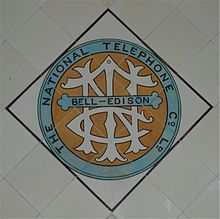National Telephone Company

Company logo of the National Telephone Company
|
|
| Private Limited Company, subsidiary of the United Telephone Company | |
| Industry | Telephone |
| Fate | Under the Telephone Transfer Act 1911 taken over (1912) |
| Predecessor | The Telephone Company (Bells Patents) Ltd |
| Successor | General Post Office (GPO) |
| Founded | 1881 |
| Headquarters | UK |
| Services | Telephone |
The National Telephone Company (NTC) was a British telephone company from 1881 until 1911 which brought together smaller local companies in the early years of the telephone. Under the Telephone Transfer Act 1911 it was taken over by the General Post Office (GPO) in 1912.
Three years after the first telephone company, The Telephone Company (Bells Patents) Ltd., appeared in London (in fact it was the first in Europe), NTC was formed on 10 March 1881, as a provincial subsidiary of the United Telephone Company Limited (UTC). The NTC was initially formed to develop and operate telephone services in Yorkshire, Nottinghamshire, Ulster and parts of Scotland, taking over UTC operations in those places.
The UTC developed other similar provincial companies throughout the British Isles between 1881 and 1885. The UTC then wished to create a new company for the amalgamation of all their associated companies. However, the government declined to issue the proposed new company with a licence to operate or to allow the transfer of an existing licence. The UTC then decided to use one of its provincial companies as a vehicle for their policy of amalgamation, starting in 1889 with the merger of the UTC with the Lancashire and Cheshire Telephone Company and the NTC. The 'National Telephone Company Limited' name being retained.
In 1886 it built an ornate red brick and terracotta building 19, Newhall Street, now grade I listed, for its Birmingham Central exchange, opened in 1887.
In 1899 it commissioned Telephone House in London's Temple Lane. The building still bears the company's NT logo and some cherubs holding what appear to be old style telephone handsets.
The amalgamation policy continued; in 1890 the NTC absorbed the Northern District Telephone Company and the South of England Telephone Company, in 1892 the Western Counties and South Wales Company and the Sheffield Telephone Exchange and Electric Light Company and in 1893 the Telephone Company of Ireland Limited. Throughout this period the NTC also took over smaller telephone companies.
With the policy of amalgamation, the NTC, under the direction of William E L Gaine as general manager and Dane Sinclair as engineer in chief, set about creating a uniform organisation over eight districts; Metropolitan, Southern, Western, Midland, North-Western, Northern, Scotland and Ireland.
...
Wikipedia
